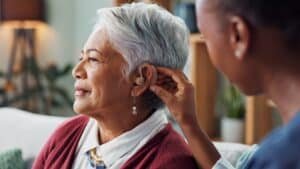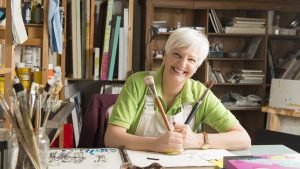
As women age, they face a variety of health challenges, and hearing loss is a common concern for those in their 60s and beyond. Despite the availability of treatments and hearing aids, accessing hearing healthcare can be fraught with administrative hurdles.
From insurance limitations to lengthy wait times for appointments, older women often find themselves navigating a complex system. However, across the country, innovative workarounds are emerging to make hearing healthcare more accessible.
For more information on hearing loss, hearing aids and how to stay socially connected, I invite you to explore our member clinics at Excellence in Audiology.
The Challenges
For many women over 60, hearing loss can significantly impact their quality of life, leading to social isolation, depression, and cognitive decline. Despite the clear need for hearing care, there are several barriers:
Insurance Issues
Medicare, the primary health insurance for those over 65, does not cover hearing aids or routine hearing exams. This leaves many older women facing significant out-of-pocket costs.
Limited Access to Specialists
Audiologists and hearing specialists are not always readily available, especially in rural areas. Long wait times for appointments can delay necessary care.
Complex Administrative Processes
The paperwork and administrative processes involved in getting approval for hearing care can be daunting, particularly for those who may already be dealing with age-related cognitive challenges.
Let’s Talk Innovative Workarounds!
To combat these barriers, various organizations and communities are developing creative solutions to improve access to hearing healthcare for older women. Here are a few notable examples:
Telehealth Services
Telehealth has become a game-changer, especially in the wake of the Covid-19 pandemic. By offering virtual consultations, audiologists can reach patients in remote areas, reducing the need for travel and wait times. This approach not only increases access but also provides a more comfortable and convenient option for older women.
Community Health Programs
In some areas, community health programs are stepping in to fill the gap. These programs often provide free or low-cost hearing screenings and hearing aids. They also offer educational workshops to help women understand the importance of hearing health and how to navigate the healthcare system.
Insurance Advocacy
Advocacy groups are working tirelessly to push for better insurance coverage for hearing care. They provide resources and support to help women understand their insurance options, appeal denied claims and find financial assistance programs.
Mobile Hearing Clinics
Some organizations have introduced mobile hearing clinics that travel to underserved areas. These clinics offer on-site hearing tests, consultations, and hearing aid fittings, making it easier for older women to get the care they need without having to navigate complex transportation logistics.
Peer Support Networks
Hearing loss can be a lonely experience, but peer support networks are helping women over 60 connect with others who understand their challenges. These networks offer emotional support, share practical tips for managing hearing loss, and provide information on accessing healthcare services.
Success Stories
One inspiring example is the success of the Hearing Loss Association of America (HLAA). HLAA has been instrumental in advocating for better hearing healthcare policies and providing resources for those with hearing loss. Their initiatives, such as the Walk4Hearing events, raise awareness and funds to support hearing health programs.
Another success story comes from rural Minnesota, where a mobile hearing clinic operated by a local nonprofit has drastically reduced wait times for hearing tests and made it possible for many older women to receive hearing aids without traveling long distances.
Hearing healthcare is a vital component of overall well-being, especially for women over 60. While there are significant administrative challenges, innovative workarounds are making a difference. Telehealth services, community health programs, insurance advocacy, mobile clinics, and peer support networks are all playing a role in improving access to care. By continuing to develop and expand these solutions, we can ensure that all women have the opportunity to enjoy the sounds of life, no matter their age.
Remember, your hearing is precious, and taking a few proactive steps can help you maintain it. Stay informed about these resources and support initiatives, and you’ll be better equipped to navigate the complexities of hearing healthcare.
Side Note!
Despite the innovative workarounds improving access to hearing healthcare, it’s important to recognize that the best care is often found in-office with an experienced audiologist. Telehealth services, mobile clinics, and community programs can provide valuable support, but they can’t completely replace the comprehensive evaluations and personalized care that come from face-to-face interactions with a professional.
Audiologists are trained to perform detailed assessments, which can detect subtle changes in hearing that might be missed through remote consultations. They can also provide tailored treatment plans and immediate adjustments to hearing aids, ensuring optimal performance and comfort.
In-office visits offer a controlled environment for thorough testing and allow for real-time troubleshooting and hands-on instruction on using hearing aids and other devices. The personal rapport developed during these visits fosters better communication and trust, which is crucial for effective long-term hearing care.
Experienced audiologists can also coordinate with other healthcare providers to address any related health issues, such as diabetes or cardiovascular problems, that might be contributing to hearing loss. Therefore, while workarounds are invaluable, seeking in-office care with an experienced audiologist remains the gold standard for achieving the best outcomes in hearing healthcare.
For more information on innovative workarounds for women with hearing loss, please ask me questions at www.drkeithdarrow.com.
Discussion Questions:
Have you experienced any challenges in accessing hearing healthcare, and what strategies or resources have you found helpful in overcoming these barriers? How has the availability of telehealth services or mobile hearing clinics impacted your ability to receive hearing care? Have you used any of these services, and if so, what was your experience like?
If you’ve had in-office visits with an audiologist, how do you feel these appointments compare to other forms of hearing care you’ve received? What aspects of in-person care do you find most beneficial? What kind of support or information would you find most helpful from community health programs or advocacy groups in managing your hearing health? How could these organizations better serve your needs?





